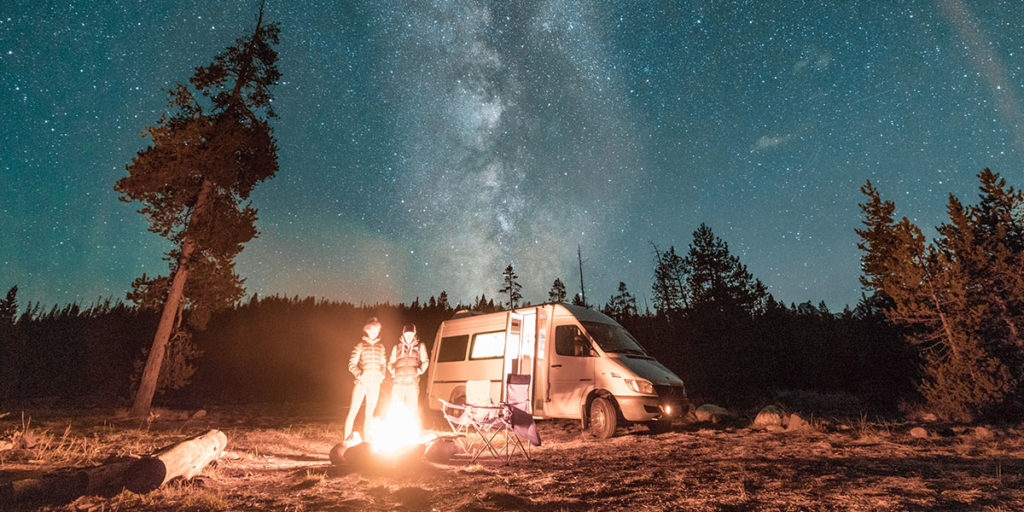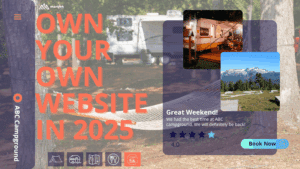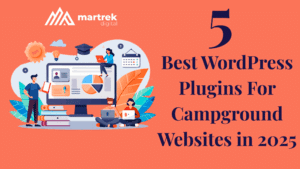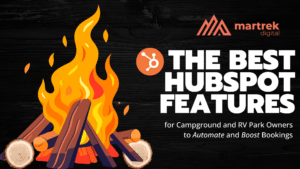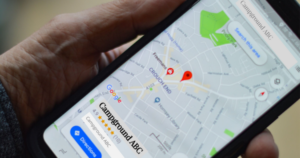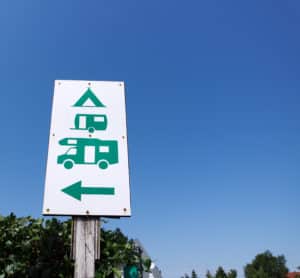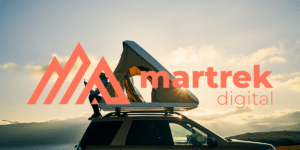Yes, your Campground or RV Park needs to be aware of SEO.
Recently, I completed leading a course with over 900 professionals focused on digital marketing and how it impacted their businesses. I had in-depth interviews with nearly 100 students who had completed a course on digital marketing to not only gather their thoughts on the course but to learn where they felt they still had areas for improvement in marketing their businesses.
Not surprisingly, SEO was overwhelmingly discussed as an area where knowledge gaps were present. And, it makes sense. With most areas of marketing, there are fairly clear-cut paths on how to achieve an objective. Sure, you may need to tweak some things here and there, depending on your audience, but the walkthrough on how to beat the game has already been written. With SEO, the algorithms to win are proprietary and the secrets to crack the code are guarded more fervently than Fort Knox.
But, what did surprise me was how many of these devoted learners thought that SEO didn’t have an impact on their business and that they were willing to dedicate themselves to email marketing, direct marketing, and paid advertising, but that they wouldn’t be pursuing how SEO could benefit them. In 2019, Brightedge released a report that 53% of web traffic comes from organic search. That means consumers are looking for answers to questions well over half the time they launch a web browser, and the businesses that are following good SEO practices are in a prime position to acquire those “free” clicks.
For Campgrounds and RV Parks, mastery of local SEO is even more important to the health of the business. With so many different options, not just for camping and outdoor activities, but with any sort of leisure activity – ranking high in organic search can be the difference between campsites being unfilled and the campground bustling with activity.
What is SEO? A 30,000-Foot Overview
SEO, an acronym for Search Engine Optimization, is the way that a website positions itself to rank on search engines to bring in more, higher-quality traffic. Whereas paid media relies heavily on your willingness to spend to get in front of eyes, SEO requires grit and determination to acquire unpaid traffic.
Most skilled practitioners of SEO focus on three main pillars to maintain and improve their organic search performance (we’ll discuss these more in-depth in future posts):
On-Page SEO
Arguably the simplest way to control your organic destiny, On-Page SEO is simply the content-driven aspects of your website that you optimize for users, and by extension, search engines. It covers everything from keyword placement and frequency, proper header tag structure, and metadata. As Google’s algorithm has improved over the years, so has the need to deliver unique, valuable content. Regurgitating what other blogs have already written about is not a good strategy for moving your way up the SERP (Search Engine Results Page).
My first job in marketing came during the infancy of SEO, where dubious practices like keyword stuffing were standard recommendations by agencies. And, it worked – organizations would do things like hiding their text on the website and repeating the same keywords over and over again to show relevance due to frequency of the keyword. In fact, my first ever meeting as a marketer was with an SEO agency. My boss favored employees who took action and were assertive. So, upon hearing recommendations that seemed to focus more on gaming the system than providing value to the reader, I piped up. “If we provide great content that people are looking for, people will come and they will engage with our site.” Silence filled the room, and you could have heard a pin drop. Of course, it’s because at the time I was dead wrong, and it was clear I didn’t understand the finer points of SEO. But in 2021, my Field of Dreams vision of “If you build it, they will come” for quality content is closer to being a reality.
The key takeaway here is to know your business’ strengths and develop a keyword strategy around those strengths. Then, create high-quality content in a way that is easily readable for users and search engines and you’ll be well on your way to achieving good on-page optimization.
Is your campground on a famous lake or in the footprint of a majestic mountain peak? Obviously, you should be messaging that. Does your RV Park have a cutting-edge pool or superior shower facilities? Find your competitive advantage and make sure your customers know it! If it is something you’ve worked to optimize in your campground, it’s probably something that is important to those who are looking to put stakes in the ground.
Off-Page SEO
While on-page optimization seems easy enough, many lose steam when it comes to Off-Page SEO. The primary task associated with off-page optimization is link building, also known as gaining backlinks. There are a number of tried and tested ways that websites go about link building, like doing guest posts for authoritative sites, finding broken links on sites and offering to replace that error with your relevant content, negotiating real estate on someone’s site through a legitimate partnership or simply begging webmasters to be gifted a follow link on their page (not recommended).
The most important thing to remember about link building is to consider the quality and authority of your links. Checking the authority of the domain is simple with Moz’s free Domain Authority tool. SEO tools can be pricey, so if your organization doesn’t already utilize a paid platform, Moz’s tool is a great way to start. Obviously, there are more gatekeepers to websites with domain authority, so set a realistic strategy in determining how you will actively seek out backlinks.
There are some other important terms to know, like brand searches, E-A-T, and social signals. Brand searches are the number of times users seek out your organization by name in the search bar, i.e. a search for “Martrek Digital”, “Who are Martrek Digital?” or “Is Martrek Partners Digital?” are branded searches.
Expertise, Authoritativeness, and Trustworthiness (more easily referred to as E-A-T) is the way that Google ranks your site in those exact three categories. While the standard advice is to simply add a curriculum vitae of a bio to your page and you’ll mostly satisfy the criteria, that most often isn’t the case in reality. Remember, Google is smarter now than it was 15 years ago. It will scour the web and look at your links and mentions to establish credibility. That way, you have a higher likelihood of receiving information from a qualified source, rather than medical advice from a digital marketing consultant or financial planning advice from a college student with an affiliate site.
Plus, for Campgrounds, consistent information in directories is ESSENTIAL to ranking highly for local searches. Tools like BrightLocal, WhiteSpark, and Yext are great for creating consistent citations on the internet that will help you gain more footing in local searches. Also, make sure you have a functioning Google My Business profile.
These are the basics of off-page SEO. If you’re looking to take your campground or RV park to the next level and you’ve exhausted these tools, there is still room to grow – but you might want to schedule a strategy session with a firm like Martrek Digital that focuses on Paid and Organic traffic for businesses directly in your industry.
Technical SEO
After looking at on and off-page optimization, it’s time to roll up your sleeves and maybe get ready to buy your IT team a steak dinner. Wait, I know what you’re saying. “We don’t have an IT team.” Well, for campgrounds and RV parks that may be limited on personnel, it’s important to enlist the services of a trusted digital marketing agency or wade into the waters of hiring developers from a Gig Economy site like Fiverr or Upwork (more on that at a later date).
Technical SEO is a large topic that will be covered in a future blog post, but it is essentially the way your website is set up to ensure search engines can crawl the site and index your page. It includes such riveting terms as XML Sitemaps, site structure, url structure, noindexing, site performance, and about two dozen (conservatively) other items you can tackle to ensure your website is optimized to be found and easily rendered by search engines like Google.
I’ll be honest – covering technical SEO any further in the context of a “30,000-foot view” probably isn’t going to help. We’ll come down for a landing at some point and further break down the intricacies of technical SEO at a later date. Until that time, I highly recommend Backlinko’s Technical SEO: The Definitive Guide. Backlinko is a wealth of information on all things SEO, and I highly recommend subscribing to their newsletter for weekly information about SEO.
One last parting thought on Technical SEO is to check your campground’s site performance using Google’s free PageSpeed Insights tool. This tool gives you a report on how well your site is loading on mobile devices and desktop platforms, and gives you actionable insights that you can use to make improvements to your site. If you’re not the owner of your website, the breakdown will be beneficial for the owner to place improvements into their backlog.
Why is SEO important for campgrounds and RV Parks with web assets?
“We don’t do SEO. We’ve tried it before and it was bad for our business.”
This was an objection I faced often while I was imploring one of our previous organizations to invest staff time into optimizing our organic strategy. The objection was based on rational concerns – the company had previously implemented some of the shortcut paths to ranking for search and were deluged by low-quality leads that infested the CRM. The problem is, SEO is a broad term, and oftentimes (especially early on) organizations would look to game the system versus optimizing their site. The result was that controls were not in place to attract the right leads while minimizing those that were unqualified.
With campgrounds and RV parks, investing in SEO best practices in some form or fashion is absolutely crucial as more and more consumer decisions are made online. Plus, if your website is following best practices for the technical side and you are providing value, your campground’s unique value proposition should attract traffic to your site. You just have to frame it right!
According to SmartInsights, 81% of online transactions begin with a web search. In the camping world, your competition is deploying a strategy SEO – the cost of not having one in place is too high.
So, where do you start?
I’ve read a lot about SEO after being glared out of that meeting with the agency nearly a decade ago. The best, most simple breakdown I’ve come across to date is Will Coombe’s 3 Months to No. 1. The book demystifies concepts that otherwise sound challenging, and it has helped many clients take the wheel and drive their SEO strategies after our initial project.
My key takeaway is that SEO is moving further away from the system that fly-by-night entities gamed for fleeting financial gain, and more toward an intent-based, value-adding tool to deliver relevant content. If you just look at your efforts to deliver content from the lens of serving your ideal customer with your particular expertise and unique insights, are focused on having a website that provides a good user experience (UX), and want to make it easy for your site to be found by search engines, you’ll be well on your way to starting a strategy and getting more tents and RVs into your park.
Of course, if you’re new to all of this, you might have a lot of studying to do. If you’re interested in accelerating your organization’s implementation of an SEO strategy following best practices to drive results, we should talk!

